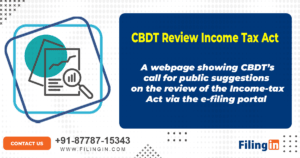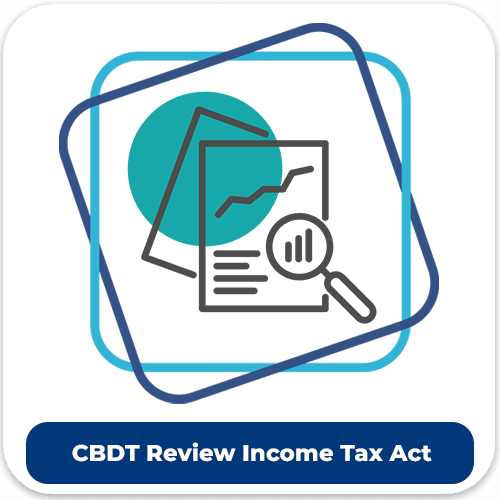The Indian Income Tax Act, 1961, is one of the most significant and complex pieces of legislation governing taxation in India. Over the years, this Act has undergone multiple amendments, making it quite intricate. To simplify and modernize it, the Central Board of Direct Taxes (CBDT) has formed a committee aimed at conducting a comprehensive review. As part of this effort, the CBDT is also encouraging public participation through a newly launched e-filing portal, inviting suggestions and inputs from stakeholders, experts, and the general public. This article dives deep into the initiative, its objectives, and the importance of public involvement.
Introduction to the Income Tax Act Review
In the 2024-25 Union Budget, Finance Minister Nirmala Sitharaman emphasized the need to review and modernize the Income-tax Act, 1961. The goal is to simplify its language, reduce litigation, minimize compliance burdens, and identify redundant or obsolete provisions. This comprehensive reform aims to make tax administration clearer, reduce disputes, and provide greater certainty for taxpayers.

Formation of the Internal Committee by CBDT
The Central Board of Direct Taxes (CBDT) has created an internal committee to oversee the review of the Income-tax Act. This committee’s primary objective is to examine the existing provisions of the Act and propose changes that will align it with modern taxation needs. This effort is driven by the need to make tax provisions more understandable and actionable for the average taxpayer while ensuring that they remain relevant in a rapidly changing economy.
Purpose of the Committee
- Simplification of Language: One of the major aims of the committee is to simplify the language of the Act, making it more user-friendly and comprehensible for both professionals and ordinary taxpayers.
- Litigation Reduction: Reducing tax disputes is crucial, as it not only saves time and resources but also builds trust between taxpayers and the government. Simplified tax provisions will reduce ambiguity, which is often the root cause of disputes.
- Compliance Reduction: The compliance burden is a significant concern for businesses and individuals alike. By simplifying processes, the committee aims to reduce the time, effort, and cost involved in fulfilling tax obligations.
- Identification of Redundant/Obsolete Provisions: Over time, some provisions of the Income-tax Act have become obsolete or redundant due to changes in the economy, industry practices, and technological advancements. The committee seeks to identify and remove such provisions, keeping the Act streamlined and relevant.
Public Input via e-Filing Portal
In an unprecedented move, the CBDT has opened up the review process to public participation. The e-filing portal has launched a special section where stakeholders, experts, and the general public can submit their suggestions and inputs regarding the Income-tax Act.
How to Submit Suggestions
To submit suggestions, users must visit the Income Tax e-filing portal, where they will be prompted to enter their name and mobile number. An OTP will be sent to their registered mobile number for validation. After successfully entering the OTP, users can submit their suggestions.
- Link to the e-filing portal: Click here to submit suggestions.
What Should Be Included in the Suggestions?
The suggestions must specify the relevant provisions of the Income-tax Act, 1961 or Income-tax Rules, 1962. Contributors are encouraged to mention the specific section, sub-section, clause, rule, sub-rule, or form number to which their suggestion relates.
Categories for Suggestions
The suggestions are expected to fall under four main categories:
- Simplification of Language: Proposals to make the Act easier to understand.
- Litigation Reduction: Ideas for reducing disputes and enhancing clarity.
- Compliance Reduction: Ways to lessen the compliance burden on taxpayers.
- Redundant/Obsolete Provisions: Identification and removal of outdated or unnecessary provisions.
Importance of Public Participation
Why Public Input Matters
Public input plays a vital role in shaping the future of the Income-tax Act. By encouraging the general public, tax professionals, and business owners to provide their feedback, the CBDT is ensuring that the revised Act will reflect the needs and realities of today’s taxpayers. This level of involvement can significantly enhance transparency and trust in the tax system.
Ensuring Inclusivity
This initiative is inclusive, allowing not just tax professionals, but anyone affected by the Income-tax Act to contribute. This broad-based participation will help ensure that the new provisions are fair, equitable, and aligned with the needs of different sectors of society.
Benefits of Reviewing the Income Tax Act
1. Reducing Tax Disputes
A clearer, more concise Income-tax Act can significantly reduce the number of disputes between taxpayers and the tax authorities. By eliminating ambiguity, the revised Act will reduce the chances of misinterpretation, thereby preventing conflicts.
2. Making Taxation More Predictable
Predictability in taxation is crucial for businesses, especially in a globalized economy. A simplified and modernized tax law will provide greater certainty to taxpayers, making it easier for them to plan their finances and investments.
3. Streamlining Compliance
Tax compliance can often be a time-consuming and expensive process. By reducing the compliance burden, businesses and individuals will be able to allocate more time and resources to productive activities rather than administrative tasks.
4. Boosting Investor Confidence
A clear and predictable tax regime will attract more foreign and domestic investments, as businesses will feel more confident about their tax obligations. This can have a positive ripple effect on the economy, boosting growth and job creation.
5. Updating Outdated Provisions
Certain provisions of the Income-tax Act have become obsolete due to technological advancements and changes in industry practices. By updating these provisions, the revised Act will be more aligned with current business environments.
Steps Forward: What Can We Expect?
The CBDT’s initiative to review the Income-tax Act is still in its early stages. However, with public participation and expert input, we can expect a more streamlined, user-friendly, and efficient tax law that will benefit all taxpayers. The review process will take time, but it represents a significant step towards modernizing India’s tax framework.
Next Steps for Taxpayers
- Get Involved: Visit the e-filing portal and submit your suggestions.
- Stay Informed: Follow updates from the CBDT and keep an eye on future announcements regarding the review.
- Prepare for Changes: Be prepared for the changes that will come with the revised Income-tax Act, and consult with tax professionals if necessary.
Conclusion
The CBDT’s move to review and modernize the Income-tax Act is a welcome step towards making India’s tax system more efficient, clear, and business-friendly. By opening the door to public suggestions, the government is ensuring that the revised Act will be reflective of the needs and concerns of all stakeholders. This is an opportunity for every taxpayer to have their voice heard and contribute to the future of India’s tax legislation.
FAQs
1. How can I submit my suggestion for the review of the Income-tax Act?
You can submit your suggestion by visiting the Income Tax e-filing portal, entering your details, and validating your submission via OTP.
2. What kind of suggestions is the CBDT looking for?
The CBDT is looking for suggestions related to simplification of language, litigation reduction, compliance reduction, and identification of redundant/obsolete provisions.
3. Is there a deadline to submit suggestions?
As of now, no specific deadline has been mentioned, but it is advisable to submit your suggestions at the earliest.
4. Can anyone submit suggestions, or is it limited to tax professionals?
Anyone can submit suggestions. This initiative is open to the general public, stakeholders, and experts.
5. Where can I find updates about the review process?
Updates will be available on the Income Tax e-filing portal and through official CBDT announcements.

